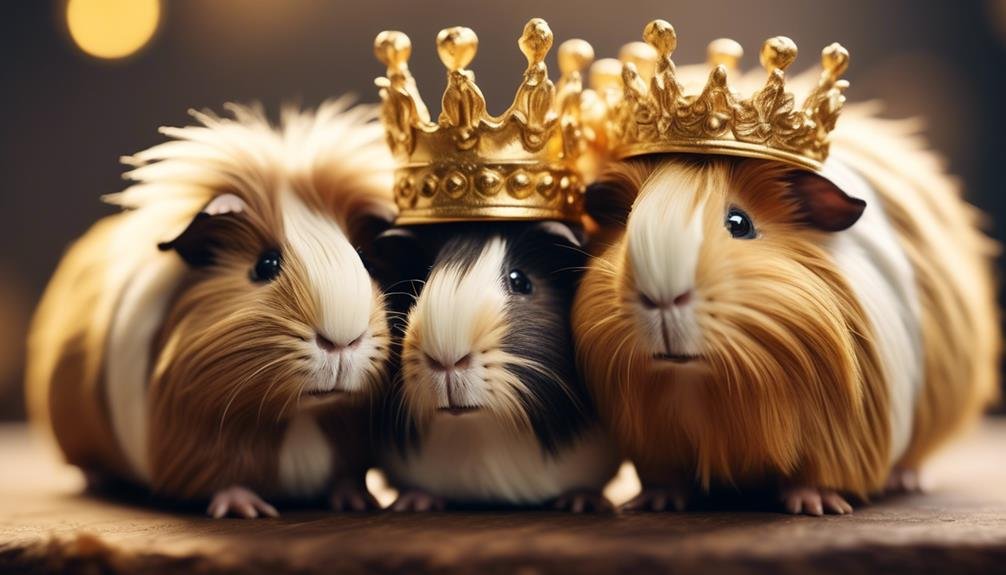
Welcome to the captivating world of Merino Guinea Pigs, where elegance and charm meet in the form of these curly-haired crowned pets. With their distinctive whorl on the forehead and long, dense fur, Merinos are a breed that demands attention.
However, caring for these adorable creatures requires expertise and dedication. In this article, we will explore the specific needs of Merino Guinea Pigs, from their fur care to outdoor keeping considerations.
Stay tuned as we unravel the secrets to keeping these delightful pets happy and healthy.
Key Takeaways
- Merino guinea pigs have a regal appearance with their long, curly fur and single whorl on the forehead.
- Regular grooming is essential for maintaining the fur of Merino guinea pigs, using a plastic comb and rounded scissors for trimming.
- Outdoor keeping is not recommended for Merino guinea pigs as their fur can become wet and dirty, leading to discomfort and health issues.
- Common health issues in Merino guinea pigs include dental problems, respiratory infections, and skin problems, which can be prevented with a balanced diet, dental care, and a clean living environment.
Merino Guinea Pig Breed Profile
The Merino guinea pig is a unique breed known for its long, dense, and curly fur, making it a distinct and sought-after choice amongst experienced owners. With its luxurious coat, the Merino stands out from other guinea pig breeds.
Unlike most guinea pigs, the Merino does not have rosettes on its fur. Instead, it has a single whorl, or crown, on its forehead, adding to its regal appearance.
This breed has a lifespan of 4 to 6 years and requires regular grooming to maintain the health and cleanliness of its fur. However, outdoor keeping is not recommended for Merinos due to the risk of their fur getting wet and dirty, which can lead to discomfort and potential health issues.
Fur Care for Merino Guinea Pigs
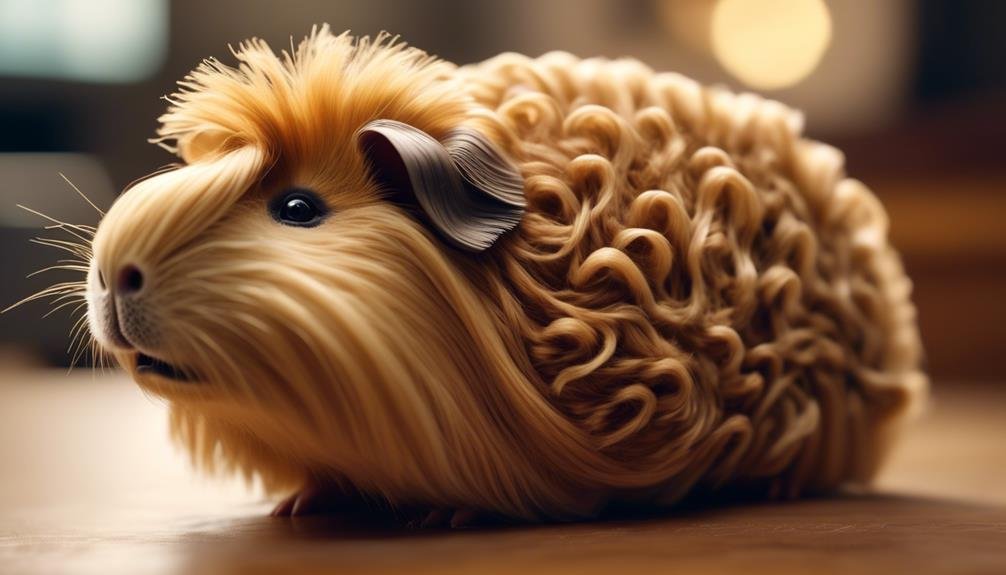
To maintain the health and appearance of their luxurious coats, Merino guinea pigs require regular and attentive fur care. Their long, soft, and curly hair needs to be groomed regularly using a plastic comb. While Merinos do clean their fur, their long hair makes it difficult for them to reach everywhere, so human assistance is necessary.
It is important to avoid using a metal comb, as it can pull out their delicate fur. Additionally, trimming the coat once or twice a month with rounded scissors is recommended, leaving a safety buffer of 0.4 inches (1 cm) from the ground.
Outdoor keeping is not suitable for Merino guinea pigs, as their fur can become wet and dirty, leading to discomfort and potential health issues.
Grooming Tips for Merino Guinea Pigs
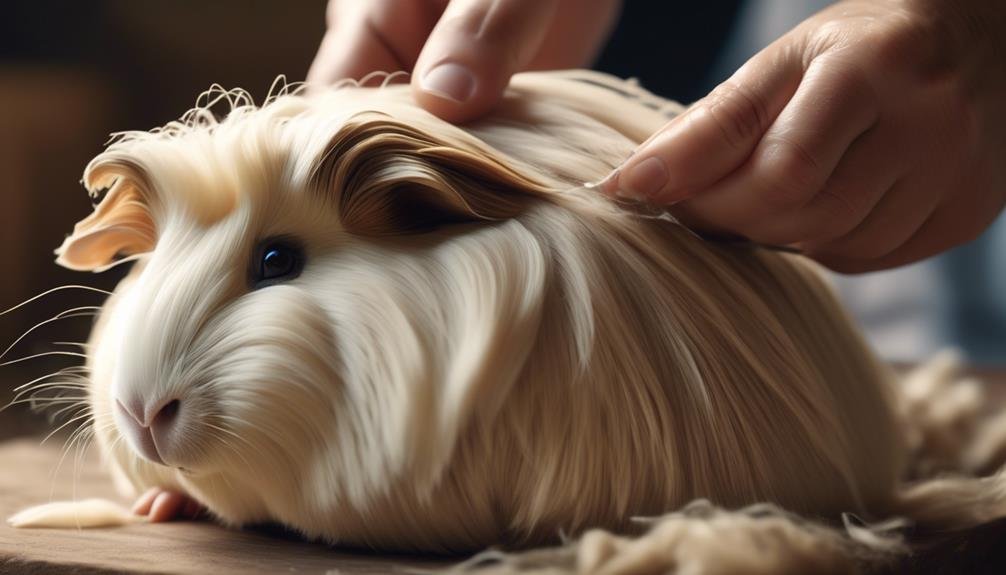
For optimal grooming of Merino guinea pigs, it is essential to follow these expert tips.
Merinos have long, soft, and curly hair that requires regular maintenance. To keep their fur in good condition, use a plastic comb for grooming as metal combs can pull out their hair.
While Merinos clean themselves, their long hair makes it difficult for them to reach everywhere. Trimming their coat once or twice a month with rounded scissors is recommended, leaving a safety buffer of 0.4 inches (1 cm) from the ground.
It is important to note that Merino guinea pigs are not suitable for outdoor keeping as their fur can become wet and dirty, leading to discomfort and potential health issues.
Outdoor Keeping Considerations
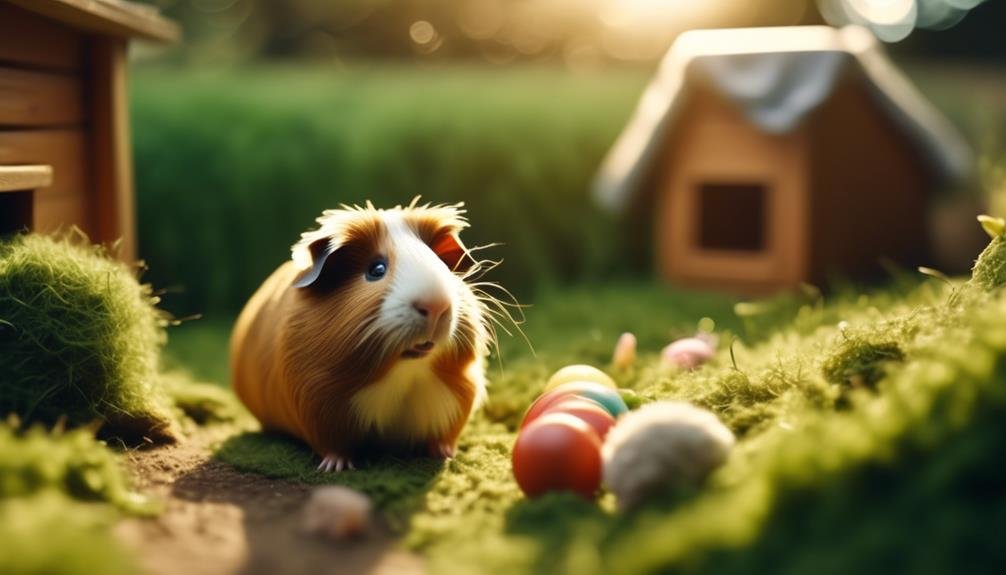
Outdoor keeping presents challenges for Merino guinea pigs due to the potential for their fur to become wet and dirty, leading to discomfort and potential health issues. Here are some important considerations when it comes to keeping Merino guinea pigs outdoors:
- Shelter: Provide a well-insulated and weatherproof shelter to protect them from rain, wind, and extreme temperatures.
- Bedding: Choose a bedding material that is absorbent and can help keep their fur dry, such as straw or wood shavings.
- Supervision: Keep a close eye on your Merino guinea pigs when they are outside to ensure their safety and prevent them from escaping or encountering predators.
- Cleaning: Regularly clean their outdoor enclosure, removing any wet or soiled bedding and ensuring a clean and hygienic living environment.
Guinea Pig Baths and Swimming Facts
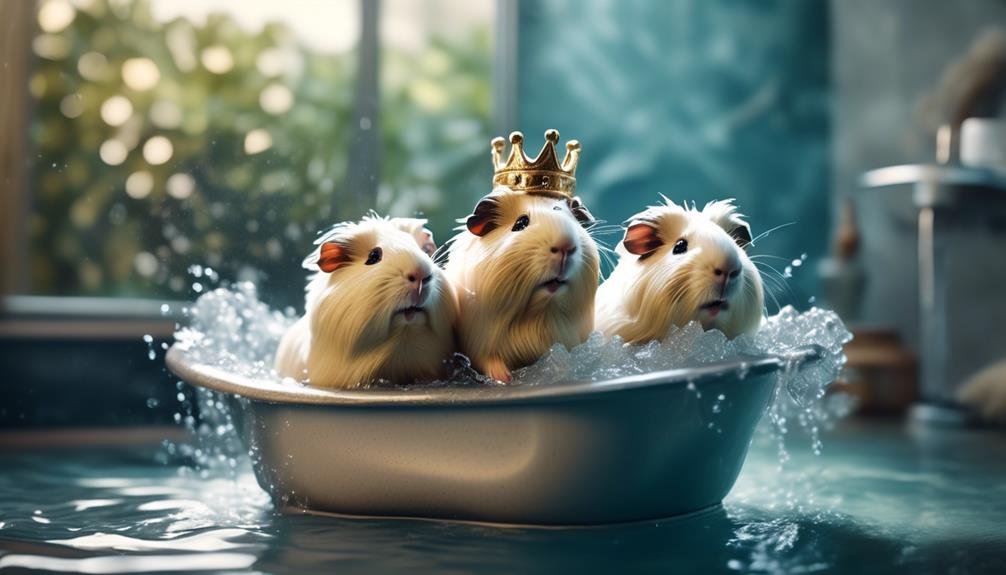
When it comes to the grooming and hygiene of Merino guinea pigs, it is important to understand some interesting facts about their bathing habits and swimming capabilities.
Unlike other pets, bathing is not necessary for healthy guinea pigs unless recommended by a vet due to parasites or fungal infections. Guinea pigs can actually swim, although it is not their natural habitat. They may enter the water to escape or when in a state of panic.
However, it is important to note that Merino guinea pigs are not suitable for outdoor keeping. Their long, curly fur can easily get wet and dirty, causing discomfort and potential health issues.
Therefore, it is best to provide them with a clean and dry environment to maintain their hygiene and well-being.
Merino Guinea Pig Fun Fact
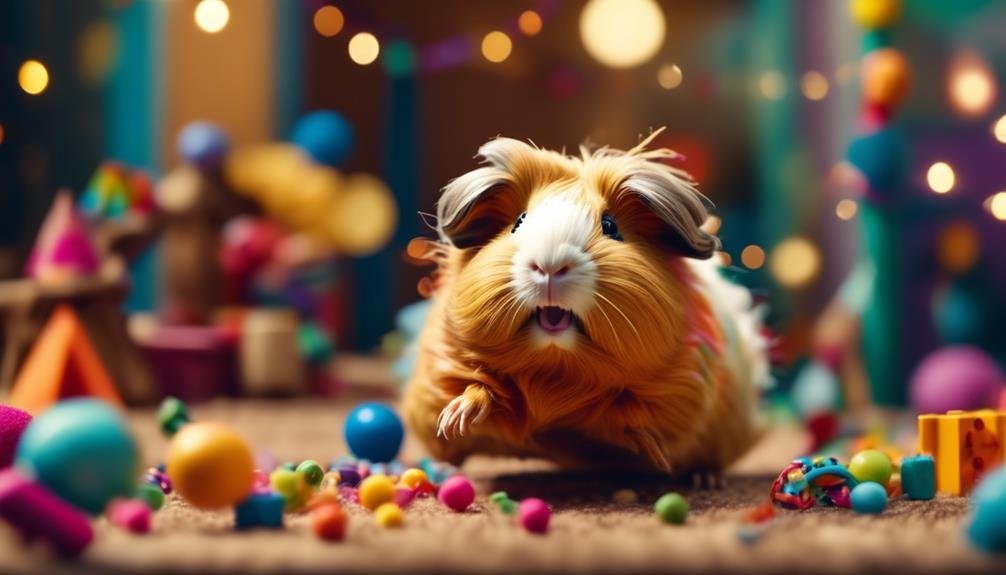
Merino guinea pigs, known for their long, curly fur and unique characteristics, have an interesting connection to another animal breed. Here is a fun fact about these adorable pets:
- Merino is also the name of a type of sheep originally from northern Africa and bred in Spain.
- Both the merino guinea pig and the merino sheep share the same name due to their luxurious and highly prized wool.
- The merino sheep is well-known for its soft and fine wool, which is highly sought after in the textile industry.
- Similarly, the merino guinea pig’s long, dense, and curly fur is considered one of its most distinctive features, making it a popular choice among guinea pig enthusiasts.
This interesting connection highlights the unique qualities of both the merino guinea pig and the merino sheep, showcasing the beauty and versatility of their respective wool.
Common Health Issues in Merino Guinea Pigs
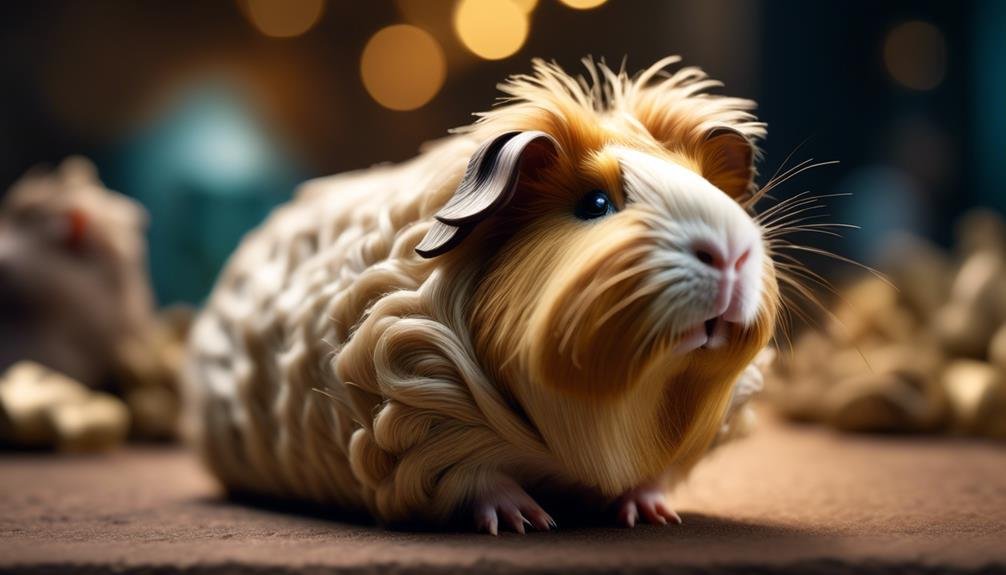
One important aspect of caring for Merino Guinea Pigs is understanding and being aware of the common health issues that may affect them. While Merinos are generally healthy and hardy, they can still be prone to certain conditions. Here are some common health issues that Merino Guinea Pigs may experience:
| Health Issue | Symptoms | Prevention and Treatment |
|---|---|---|
| Dental Problems | Difficulty eating, weight loss, overgrown teeth | Provide a balanced diet with plenty of hay and chew toys for dental wear. Regular dental check-ups by a veterinarian may be necessary. |
| Respiratory Infections | Sneezing, coughing, nasal discharge | Ensure a clean and well-ventilated living environment. Avoid drafts and sudden temperature changes. Seek veterinary treatment if symptoms persist. |
| Skin Problems | Hair loss, itching, redness, scabs | Maintain good hygiene and cleanliness. Regularly check for parasites such as mites. Consult a veterinarian for proper diagnosis and treatment. |
Tips for Choosing and Caring for a Merino Guinea Pig
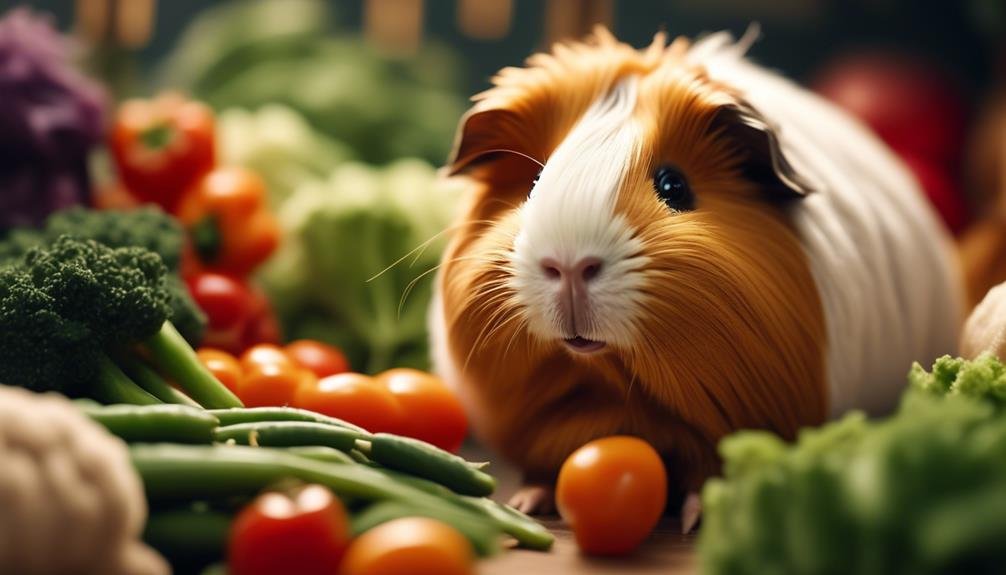
To ensure optimal care and well-being for a Merino Guinea Pig, it is essential to consider a few important factors when choosing and caring for this unique breed.
- Research and Preparation:
- Learn about the specific needs and characteristics of Merino Guinea Pigs.
- Understand the commitment and responsibilities involved in their care.
- Gather necessary supplies such as a suitable cage, bedding, food, and grooming tools.
- Health and Wellness:
- Schedule regular check-ups with a knowledgeable veterinarian.
- Provide a balanced diet consisting of high-quality hay, fresh vegetables, and pellets.
- Offer plenty of fresh water and ensure a clean living environment.
- Maintain good hygiene by regularly cleaning the cage and grooming their fur.
- Socialization and Stimulation:
- Merino Guinea Pigs are social animals and require companionship.
- Consider getting a pair or introducing them to other compatible guinea pigs.
- Provide mental stimulation through toys, tunnels, and hideouts.
- Spend quality time interacting with and handling your Merino Guinea Pig.
- Safety and Environment:
- Create a safe and secure living space, free from hazards and predators.
- Maintain a comfortable temperature between 65-75°F (18-24°C).
- Protect them from direct sunlight, drafts, and extreme temperatures.
- Monitor their behavior and health regularly for any signs of distress or illness.
Frequently Asked Questions
Can I Keep a Merino Guinea Pig Outdoors?
No, keeping a Merino guinea pig outdoors is not recommended. Their long, curly fur can easily become wet and dirty, leading to discomfort and potential health issues. It is best to keep them indoors.
How Often Should I Bathe My Merino Guinea Pig?
Bathing is not necessary for healthy guinea pigs unless recommended by a vet. Merino guinea pigs, known for their long and curly hair, can swim but it’s not their natural habitat. They may enter water in panic.
Can I Use a Metal Comb to Groom My Merino Guinea Pig?
Using a metal comb to groom a Merino Guinea Pig is not recommended. Their long, curly hair can easily get pulled out, causing discomfort and potential harm. It is best to use a plastic comb for regular grooming.
Do Merino Guinea Pigs Have Any Specific Health Issues I Should Be Aware Of?
Merino guinea pigs do not have any specific health issues that are exclusive to their breed. However, like all guinea pigs, they are prone to dental problems, respiratory issues, and obesity if not provided with a balanced diet and proper care.
Are Merino Guinea Pigs Good Pets for First-Time Owners?
Merino guinea pigs are not recommended for first-time owners due to their specific grooming needs, such as regular combing and coat trimming. Their long, curly fur requires experienced handling and maintenance.
What Are the Main Differences Between Merino and Silkie Guinea Pigs?
When comparing merino and silkie guinea pig breed characteristics, the main differences lie in their coat texture and appearance. While merinos have curly and dense wool, silkies have long, straight, and silky hair that requires more grooming. Additionally, silkies tend to have a more docile temperament compared to merinos.
Conclusion
In conclusion, Merino Guinea Pigs are charming and distinctive pets with their long, curly fur and crown-like whorl on their forehead. Proper care and attention are essential for these adorable creatures, including regular grooming to maintain their dense fur.
Outdoor keeping should be approached with caution, as wet and dirty fur can lead to discomfort and health issues. Bathing should only be done when necessary, as swimming is not a natural behavior for Merinos.
Overall, Merino Guinea Pigs require experienced owners who can meet their specific needs.




